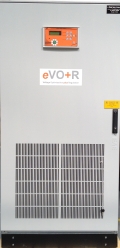Voltage management — it’s all in the site survey

Managing the voltage to a building can be highly effective at reducing electricity consumption — but how effective might it be for your site? Craig Needham of e-fficient Energy Systems shares his experience.
The Carbon Trust helpfully published late last year its clear explanation of the benefits of voltage management, how it works, and proscribed a methodology on how site surveys should be conducted. This has developed a minimum standard for the industry and has really helped potential customers understand what voltage management is all about and how it is, or is not, applicable to their needs.
Crucial as the Carbon Trust’s process is, there is also a stark warning as to what does and does not constitute voltage-management technology. Additionally the methodology is not just a case of plugging in a simple voltage logger, and using kWh data. Without the prospective supplier physically attending site the potential savings are just guesswork, and the likelihood will be that the solution proposed will not reflect the load profile of your equipment — with potentially dangerous results.
The simple reality is that voltage management (VM), whether in its simplest form of voltage optimisation (VO) or in its more effective and technologically more advanced format of voltage optimisation plus regulation (VO+R), does not deliver savings for all types of electrical equipment.
If you are considering voltage-management solutions, your prospective supplier needs to conduct a full and comprehensive site survey and provide you with detailed information with their proposal before you should contemplate placing your order.
Voltage management works because most incoming UK voltages are not at the 230 V we expect but fluctuate across a range between 216 and 253 V. Voltage also varies during the day.
The survey needs to include at least a week-long mains-voltage and load analysis, together with a full and comprehensive site survey detailing which electrical assets on your site will respond to voltage management and which will not. The site survey is also the key to determining the system size required and an honest appraisal of the potential for savings.
This comprehensive mains analysis will detail for you a whole host of characteristics of your site, which basic voltage loggers cannot do. The minimum you should see is an analysis including the following: nominal voltage; voltage swing; power factor; load imbalance; peak inrush current and voltage drop across your site — in essence a full evaluation of your load profile.
Only with this information is it possible to determine the correct system size requirement.
The site survey must include a unit-by-unit evaluation of all the equipment on site as savings are only available from certain types of equipment, as explained below.
The next step is to determine which of your equipment will give you savings and which will not.
Savings are only available from certain types of electrical equipment.

There are essentially two types of electrical equipment — those that are voltage dependent and those that are voltage independent.
Voltage-dependent devices consume power proportional to the supply voltage. The higher the voltage, the higher the power consumption. If you reduce the voltage, you will use less electricity. A 1% decrease in supply voltage will cause a 2% reduction in power demand — saving you money. Examples of voltage-dependent devices include incandescent lamps, T8 and T12 fluorescent lamps, many motors and air-conditioning units.
Voltage-independent devices, however, are designed to consume energy regardless of the supply voltage, and savings are not possible. Examples include T5 and LED lighting, ICT equipment and variable-speed drives.
Some types of equipment are ‘partially dependent’, but most of your equipment on site will be dependent or independent. Savings are possible on voltage-dependent devices but not on those that are voltage independent.
Determining what these savings could be for you requires this comprehensive site survey and evaluation of your mains voltage and load profile. It is only by doing this that you can be confident that the solution that is being proposed is fit for purpose.
The Carbon Trust has worked hard to raise awareness of the benefits of voltage management, but has cautioned that it is not right for everyone. Unless you follow the Carbon Trust methodology you may well be over-promised a system that fails to deliver.
My company has adopted an honest approach following this methodology recommended by the Carbon Trust, and will tell you if voltage management is or isn't right for you. Utilising their voltage optimisation plus regulation technology you can be assured that the approach and technology provides the correct solution. This approach is being welcomed by many companies who have been concerned by the over-promises and under-delivery they’ve seen over the past few years.
Voltage optimisation plus regulation gives users the opportunity of achieving the greatest electricity savings and addressing the many technical issues often seen with ‘step-down’ basic voltage-optimisation systems.
To find out whether voltage management can help you reduce your electricity usage and carbon footprint, e-fficient Energy offers a free site survey to encourage companies to see if it will work for them.
Craig Needham is managing director of e-fficient Energy Systems Ltd.








